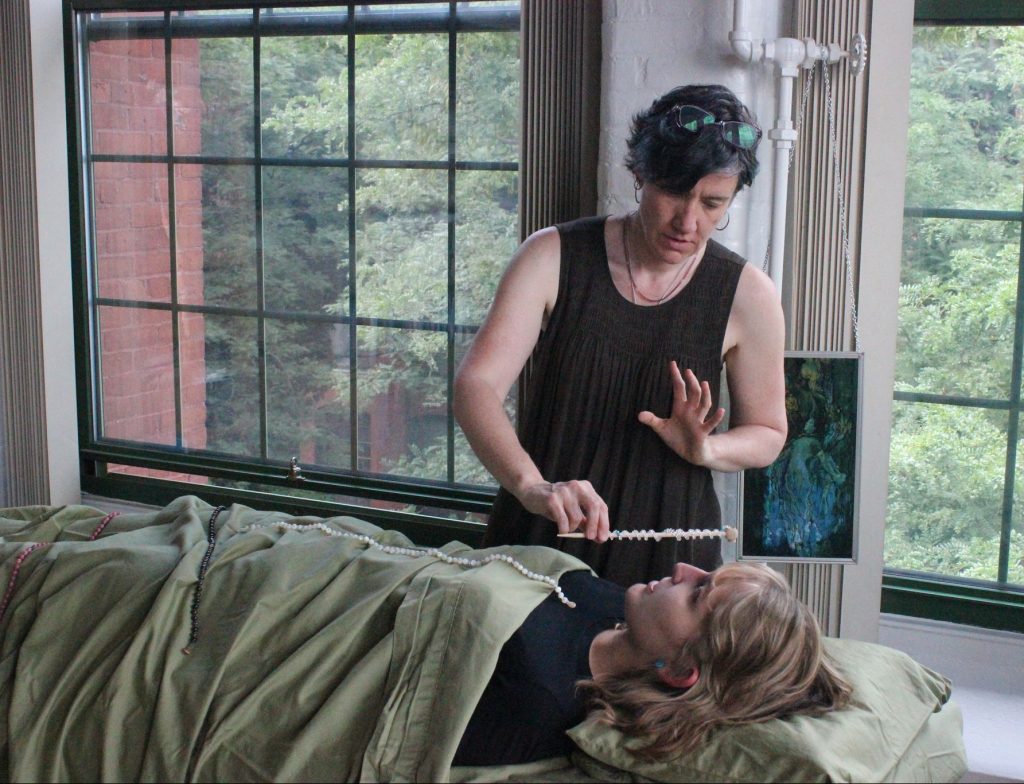Since 2010, I’ve given thousands of Diamond and Gemstone Therapy sessions. But I don’t consider myself a healer or a therapist, nor do I teach my students to be healers.
I do train students to practice Diamond and Gemstone Therapy, to be practitioners of this art and science of nature—but that’s not the same as teaching them to be “healers.”
Without doubt, some people have an interest and natural proficiency in helping others through their health experiences and may even be gifted at doing so. Just being in the presence of these special individuals can make you feel better. You might indeed call them healers.
While they can help you feel more comfortable, they aren’t directly making you heal. Herein lies the difference. Most people define a healer as a person who applies a modality to another person to change an unbalanced, diseased, damaged, or weakened state and make it healthy.
But as practitioners, we are not the ones doing the healing. A client’s or patient’s body already knows how to heal. It has innate instructions, which I call blueprints, that guide its health and healing. Our job is to help a client’s body heal itself.
You might say this is just a matter of words, and you’re right. But words matter.
The Downside of Calling Yourself a Healer
If you call yourself a healer, people expect an outcome from you. This can be draining as they latch onto your energy field hoping for a miracle.
It can be very difficult to separate yourself from a client’s expectations. Most practitioners aren’t trained to do this, and so they wind up unintentionally creating karma with their client. Their sessions are not karma-free.
Simply put, karma is another word for the universal law of cause and effect. It provides the mechanism for learning lessons and fulfilling our purpose in this lifetime. It affects every action, word, feeling, memory, thought, and intuition. Everything you do either creates or resolves karma.
What Is a Karma-Free Session?
Karma-free sessions are given in a way that the practitioner’s actions and expressions do not generate additional karma for herself or for her client. Working with energies in a distant healing session when your clients can’t see what you’re doing (and sometimes don’t feel it either) makes it particularly easy to create and take on karma.
This happens during in-person sessions, too.
Practitioners who feel they have taken on some of their client’s unwanted energy, who can’t stop thinking about a certain client, or who heal by sending light have created karma for themselves. When a client feels he’s taken on the practitioner’s energy or feels wounded or worse off after energy work, it means he received a session that was not karma-free.
A practitioner needs to walk a very fine line and be fully conscious of what she’s doing in order to give distant healing sessions without creating additional karma for herself or her clients.
She starts by being very aware of and sensitive to the words she uses.
Using Words Mindfully in a Karma-Free Practice
This is why, at the Gemstone Therapy Institute, we don’t say we “do people” or “work on” them. We don’t say “I’m going to do her later,” or “I did him yesterday.” Instead, we say we work “with” people.
I still sometimes make the mistake of saying “I’m going to work on her.” Maybe you’ve even said something like that yourself. But in a karma-free session you do not “work on” your clients. Working on people implies that you’re doing something to them, when what you’re actually doing is assisting clients with their healing process. You’re helping them reconnect with their natural ability to self-heal.
In truth, no one can do any more than this. No one can make someone else heal. But with training in a modality like Diamond or Gemstone Therapy, you can support others on their healing journey.
Some medical doctors might think this applies to energy medicine only. I believe it applies to modern Western medicine as well. Doctors don’t “heal” patients either—they give them medicine that helps their bodies heal themselves, or they perform surgeries that give their patients’ bodies a real boost in their self-healing process.
What Does it Mean to “Cure”?
The word “cure” can also be problematic. According to the dictionary, “A cure is a substance or procedure that ends a medical condition.” Yet many people will be taking the same medicines for the rest of their lives.
Let me give you an example from my own experience. In 2002 my heart failed, and in 2005 I received a heart transplant. You could say that the new heart cured my heart condition. I no longer have cardiomyopathy or a need to wear a pacemaker. I now have a healthy heart.
But I can assure you this was not a total cure. While I no longer have to wear a pacemaker, the transplant did not address the underlying issues and concerns that ultimately manifested as a dying heart—which needed to be replaced for me to stay alive. Those issues come up every now and then, and I still have to face them.
Energy medicine, even Diamond or Gemstone Therapy, does not cure, either. But it can 1. support your body’s ability to self-heal, 2. alleviate symptoms in some cases, 3. help you relax so that you can receive healing energy from within yourself and from the gemstones, and 4. open the door for you to recognize the underlying reasons why you have the conditions you’re faced with and what the associated lessons might be.
It’s a good adjunct to modern medicine.
The Power of Words
Students of the Gemstone Therapy Institute learn not to wish or imagine someone will get better. This is a sure way to take on some of their karma, or the energy of their condition. We have no idea the underlying reasons for a person’s experience. Trying to change it for them without asking is an interference.
Between 2002 and 2005, when my heart was very sick, people would tell me they were praying for my heart to get better. While ultimately I did get better, it didn’t happen in the way these supplicants were hoping for. My heart did not get better.
Thankfully so, because my heart failing is what led me to get a new heart, and that was the best thing that could have happened to me.
The experiences associated with my heart transplant prompted me to return to my work with gemstones, which I had left in 1992. It’s a long story and I wrote a book about it—so I won’t go into it now. But if those prayers had been answered—if the words these supplicants were praying actually healed my heart, I would not have returned to my work with healing Diamonds and gemstones.
I’m grateful I had these experiences, and I’ve learned some good lessons on the power of words. I have forgiven those whose words pressed upon me, words whose power tried veering me away from my destiny. But I also felt a profound sense of protection throughout the entire heart transplant experience.
What Does it Mean to Heal?
The dictionary states that “to heal is to cause to become sound or healthy again.”
I am not a healer. No one is, because you can’t impose health on someone else; that can only happen from within a person. Only the body can heal itself.
What I am is a practitioner who supports the healing process in others.
According to the National Institutes of Health, “Healing is an intensely personal, subjective experience involving a reconciliation of the meaning an individual ascribes to distressing events with his or her perception of wholeness as a person.”* Nobody can give this to another, or force it upon them, even if they desperately want it.
Honoring the Healing Journeys of Others
I also believe that we have to honor people’s healing journeys. We cannot look at someone who is suffering and say or even think to ourselves, “Gosh, what lesson is SHE trying to learn?” or “She’s sick because that’s her karma,” or “She must have done something really bad in the past to be so challenged in this lifetime.” This type of thinking is inappropriate and insensitive.
Hospitals are filled with people who made mistakes, who didn’t learn lessons soon enough, who are working out their karma, and who are struggling even to recognize that there might be something to learn within their suffering. And still, doctors and nurses will do their very best to help them become stable once again. We can learn from their wholehearted and unconditional support of their patients.
So what’s the point of being mindful of saying that we work with people rather than on them? Why make a big deal about the distinction that we aren’t healers but practitioners?
Reasons to Be Mindful of Your Words
One reason to be mindful of your words is that it builds trust. The more a client trusts you, the more open she will be, the deeper you’ll be able to work, the closer to the truth you’ll be able to reach, and the more effective and meaningful your sessions will be.
Being mindful of your words also puts you in a state of self-awareness and centeredness within yourself. This is how you can get in touch with your own blueprints of health and healing. By doing so, you become the best practitioner you can be, more in touch with your intuition, and better able to access anything you’ve ever learned that might be helpful in the moment.
In the world of Diamond and Gemstone Therapy, there’s another reason we are not healers, and that’s because we allow the gemstones to do the work. It’s the gemstone energies that help a client to find the balance, harmony, and ease required to connect with their blueprint truth and take a meaningful step on their healing journey.
If you’d like to learn more about how to give safe, meaningful, and effective distant healing sessions without taking on your client’s karma or vice versa, click the link below.
*https://www.ncbi.nlm.nih.gov/pmc/articles/PMC1466870/




